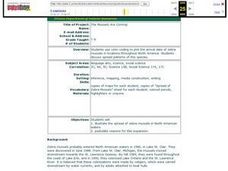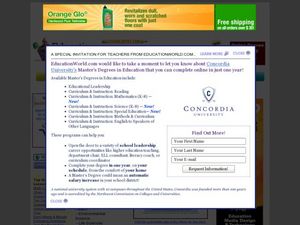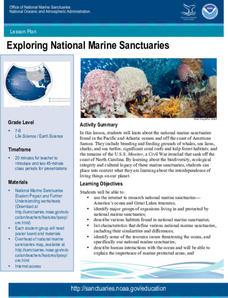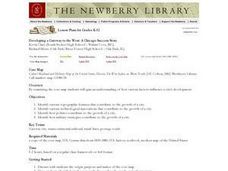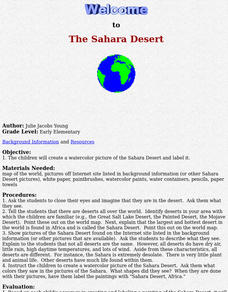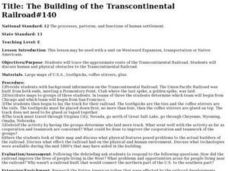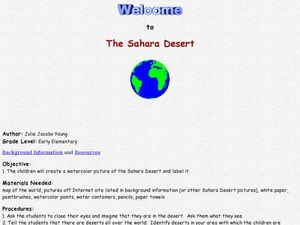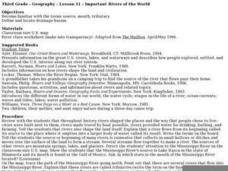Curated OER
Finding Your Way Around the I & M Canal
Fifth graders utilize a map of the I&M Canal (imbedded in this plan), and perform a series of tasks. They calculate distance, find specific points of interest and solve a set of story problems about the canal.
Curated OER
Angkor What? Angkor Wat!
Tenth graders examine Angkor Wat and its place in history. They visit websites, utilize maps, and complete interactive worksheets. Students investigate the local temple to discover its purpose.
Curated OER
Discovering the Oasis
Students focus on the types of vegetation and animal life living around local water sources. This lesson can be adapted to any local water source, whether it be a lake, a river, stream or ocean. It has a particular focus on the bird...
Curated OER
Designing a Park and Lodge
Students view a video entitle Great Lodges of the National Parks. They design, in groups of three, their own park based on research of a specific area. Each member of the group possess a different task in order to accomplish the project.
Curated OER
The Mussels Are Coming
Learners work together to identify and describe the various types of mussels. Using a color-coded system, they plot the arrival date of zebra mussels in North American waters. They discuss the increase in their population with the class.
Scholastic
Perfect Postcards: Illinois
Connect the geography and history of Illinois using an art-centered lesson on the railroads. The railroad connected once-distant places, particularly in the Midwest. Using research, class members create postcards of fictional cross-state...
Curated OER
Aquatic Exotics
Students identify and describe the aquatic exotic species found in Illinois. Using the internet, they research the species origins and discover their effects on native species in the area. They discuss how appropriate it is to introduce...
Curated OER
Rising Temperatures Threaten Penguins
Students examine the continent of Antarctica, then read a news article about the decline in the Antarctic penguin population. In this current events lesson, the teacher introduces the article with a discussion and vocabulary activity,...
Curated OER
Michigan History of Philanthropy
Students investigate how philanthropy began in Michigan. In this philanthropy lesson, students read Michigan History of Philanthropy and read a timeline of several events. Students create a picture with a sentence about a time when they...
Curated OER
Major American Water Routes
Sixth graders locate and identify the major bodies of water and waterways in the United States. Through a simulation activity, they describe how early explorers would have described their surroundings. Working in groups, they create...
Curated OER
Cities as Transportation Centers
Students work in small groups to identify some of the major transportation centers, recommending two as possible sites for a national political convention, based on population density and the travel networks available in 1835.
Curated OER
Looking for Clues
Learners infer the cause of a shipwreck based upon information about artifacts found in the wreck. In this marine archeology lesson, students use an inventory list to infer the cause of a shipwreck. Learners discuss the maritime...
Curated OER
Doing Our Share Lesson 1: Michigan History of Philanthropy
Students research the history of philanthropy in Michigan by looking at images and pictures while discussing the definition of philanthropy. They design a picture of the first time they saw a philanthropic act and write three sentences...
Curated OER
Exploring National Marine Sanctuaries
Students conduct Internet research of the living organisms in national marine sanctuaries, and the resources protected in the sanctuaries. Students gather information about each of the sanctuaries and make an oral presentation and poster...
Curated OER
Utah Weather
Fourth graders diagram the weather in Utah through the use of a glyph. In this Utah weather lesson plan, 4th graders create weather glyphs of different areas in the state. Students answer questions about the weather and then compare...
Curated OER
Repopulating Michigan's Waterways
Eleventh graders identify the parts of an ecosystem and how communities change over time. In this ecology lesson students formulate a habitat restoration plan.
Curated OER
Developing a Gateway to the West
Learners identify various topographical features that contribute to the growth of a city. They identify how military strategies contribute to the growth of a city.
Curated OER
The Sahara Desert
The children will create a watercolor picture of the Sahara Desert and label it.
Curated OER
Treaties- Grade 7
Seventh graders examine treaties pertaining to the Canadian natives. In this Canadian history lesson, 7th graders research and discuss the negotiations that took place between the First Nations cultures and the Canadian government over...
Curated OER
Native Americans Names
Third graders are introduced to the Native American groups of Michigan. Using primary source documents, they reconstruct events that occured in their local community. They discover the names of cities and towns in Michigan are related to...
Curated OER
The Building of the Transcontinental Railroad#140
Students participation in a simulation of laying the track of Transcontinental Railroad starting from three different locations. They use toothpicks and coffee stirrers to build the rails. They evaluate which group laid the most track...
Curated OER
Identifying Pennsylvania Watersheds
Ninth graders study and identify the six major drainage systems in Pennsylvania. In this watershed lesson students read an article, complete an activity and take a quiz on what they learned.
Curated OER
Welcome to the Sahara Desert
Students explore their artistic skills. In this Sahara Desert lesson, students use the Internet to research the Sahara and paint a watercolor picture depicting the desert.
Curated OER
Important Rivers of the World
Third graders become familiar with names of the different parts of a river, define and locate drainage basins, locate six of the continents and explore the major rivers on each one, conduct research on a river of their choice.






